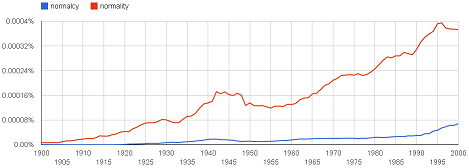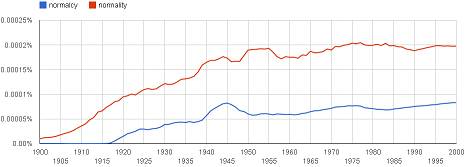Does anyone use 'normalcy'? It is ridiculed in Britain as an American affectation, especially since there is a time-honoured word which means exactly the same thing i.e 'normality'.
-
Where have you heard that used? I have not heard of it before.– TristanCommented Sep 27, 2013 at 9:44
-
1As you could easily discover, Wiktionary has: Usage notes: Although sometimes used, normalcy is less common than normality in American English. It is very rarely used in the UK, Canada, Australia, and New Zealand. It is frequent in India, however.>> But confusingly, the ratio of Google hits for normality : normalcy does not really reflect this at about 3 : 2.– Edwin AshworthCommented Sep 27, 2013 at 9:50
-
I think normalcy is a very specific mathematical term, while normality conveys broader and more abstract idea of being normal (whatever meant by that).– MykolaCommented Sep 27, 2013 at 9:51
-
3I constantly hear 'normalcy' being used by Americans. News reporters used it extensively at the time of the Boston outrage, about the city returning to 'normalcy'. It is noted in the OED, at the end of normal, together with 'normality' with 'chiefly N. American' added in brackets.– user52780Commented Sep 27, 2013 at 10:03
-
1@Strangerbird Your OED is different to mine. ODO (oxforddictionaries.com) is not the OED.– Andrew Leach ♦Commented Sep 27, 2013 at 10:37
2 Answers
The OED lists normalcy as a headword with "Chiefly U.S." There is a telling citation:
1929 G. N. Clark in S.P.E. Tract xxxiii. 417 If..‘normalcy’ is ever to become an accepted word it will presumably be because the late President Harding did not know any better.
The earliest citations are from 1845, in a strictly mathematical sense (the condition of a line being normal [perpendicular] to another).
Normality dates from a similar time, but has the sense of "what may be usually expected". British English has retained that distinction.
-
That is a very interesting and definitive response. I own up to the fact that I had not realised the word 'normalcy' had such an origin. 'Normality' follows the French 'normalite'(with acute accent on the e). Nothing in the French language resembles 'normalcy' so one assumes it is entirely of N American origin. One thing worth remembering is that in the mid 19th century English was still a long way away from being the world's Lingua Franca. French was the language of Europe's aristocracy and of diplomacy. Many English words from this period undoubtedly derive from the hegemony of French.– user52780Commented Sep 27, 2013 at 13:43
-
This question of words becoming accepted because someone 'didn't know any better', may also apply in Britain. I did hear that some of the slightly daft expressions of greeting etc that we use, such as 'What ho!' and 'hey what!' were first uttered by George l (or maybe George ll) whose first language was German. Courtiers and sychophants used to imitate his incorrect manner of speaking, and the expressions stayed with us.– user52780Commented Sep 27, 2013 at 16:39
-
I had heard of President Warren Harding being mocked by the intelligentsia for the slogan "Back to Normalcy" in the 1920s.– OldcatCommented Aug 14, 2014 at 18:56
-
Compare: books.google.com/ngrams/… vs. books.google.com/ngrams/…– KrisCommented Jun 8, 2016 at 8:53
-
Here's a link to that 1857 Davies & Peck OED reference: books.google.com/…– mblakeleCommented Sep 2, 2019 at 19:27
Nothing to be ridiculed about as such.
Although sometimes used, normalcy is less common than normality in American English. It is very rarely used in the UK, Canada, Australia, and New Zealand. It is frequent in India, however. (Wiktionary)
The word normalcy is used both in AmE as well as BrE, though to a lesser extent than normality.
normalcy vs. normality, AmE, 1900-2009

normalcy vs. normality, BrE, 1900-2009

Overall, normalcy seems to be used chiefly in news reporting and commonly in its 'idiomatic' sense (see further below).
normalcy vs. normality, English, 1900-2000

The American tendency for normalcy is probably based on its 'idiomatic' sense:
"A return to normalcy" (i.e. a return to the way of life before World War I) was United States presidential candidate Warren G. Harding’s campaign promise in the election of 1920. Although detractors believed that the word was a neologism as well as a malapropism coined by Harding (as opposed to the more accepted term normality), there was contemporary discussion and evidence found that normalcy had been listed in dictionaries as far back as 1857. (WP)
-
3Why can't people simply say 'Things have returned to normal'? For me normalcy smacks of a word where some guy (seems Warren Harding is that villian) couldn't think of the proper word and it has stuck as part of lazy speech. Whilst I can accept changes in language where they are creative and for good reason, normalcy it would appear to me is just a reflection of bone-headed ignorance.– user52780Commented Sep 28, 2013 at 19:34
-
1It also seems to reflect a tendency never to use a six-letter word where an eight, ten or twelve-letter one might be possible. People will refer to someone's 'reverential' attitude, never their 'reverent' one.– user52780Commented Sep 28, 2013 at 19:41
-
2Suffice it to say, I have been around a long time and I have never heard a British person say 'normalcy', nor have I ever seen it written in a newspaper or a book.– user52780Commented Sep 28, 2013 at 19:53
-
2It wouldn't be the first time that talking heads mocked a politician mercilessly when they were correct and the "more intelligent" press incorrect.– OldcatCommented Aug 14, 2014 at 18:57
-
Well, if word brevity is to be the criterion, why not dump the noun 'normal' in favour of 'norm'? Commented Mar 1, 2021 at 1:21
